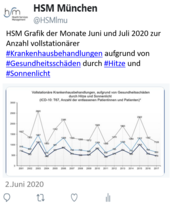Survival in patients with incident dementia compared with a control group: a five-year follow-up.
| Authors/Editors: |
Koller, D. Kaduszkiewicz, D Bussche, H Van Den Eisele, M Wiese, B Glaeske, G Hoffmann, F |
|---|---|
| Publication Date: | 2012 |
| Type of Publication: | Articles in Refereed Journals (International) |
| ISBN/ISSN: | 1041-6102 |
| erschienen in: | Int. Psychogeriatrics |
| Weitere Quellenangabe: | Volume 24(9), Pages 1522 – 30 |
Abstract
Background
Dementia is an important disease in older age. Existing studies on dementia mortality face limitations. For instance, they are based on prevalent, small, or geographically limited samples or do not include controls. We aimed to study survival after the first diagnosis of dementia compared with a control group.
Methods
We analyzed claims data of a German health insurance company, including 1,818 incident dementia cases and 7,235 age- and sex-matched non-dementia controls (53% male; mean age 78.8 years). The follow-up was five years. We assessed survival with the Kaplan-Meier curves and performed Cox proportional hazard regression, also including nursing care dependency and comorbidities.
Results
The cumulative five-year mortality was 53.5% in the dementia cases and 31.1% in the control group (hazard ratio: 2.1). Even after adjusting for comorbidities and nursing care, the mortality risk was 1.5 times higher for patients with incident dementia than for controls. Nursing care dependency showed high influence on mortality, likewise in dementia patients and controls.
Conclusions
Although some factors, such as education or the type and severity of dementia, could not be included in the analyses, our study shows a clear influence of dementia on mortality irrespective of age, sex, care dependency, and comorbidities. The strongest influence on mortality was found for dementia patients with nursing care dependency. Taking into account their mortality of around 70% in care level 1 and up to 80% in care levels 2 and 3, healthcare delivery to these patient groups should strongly consider elements of palliative care focusing on the quality of life.





